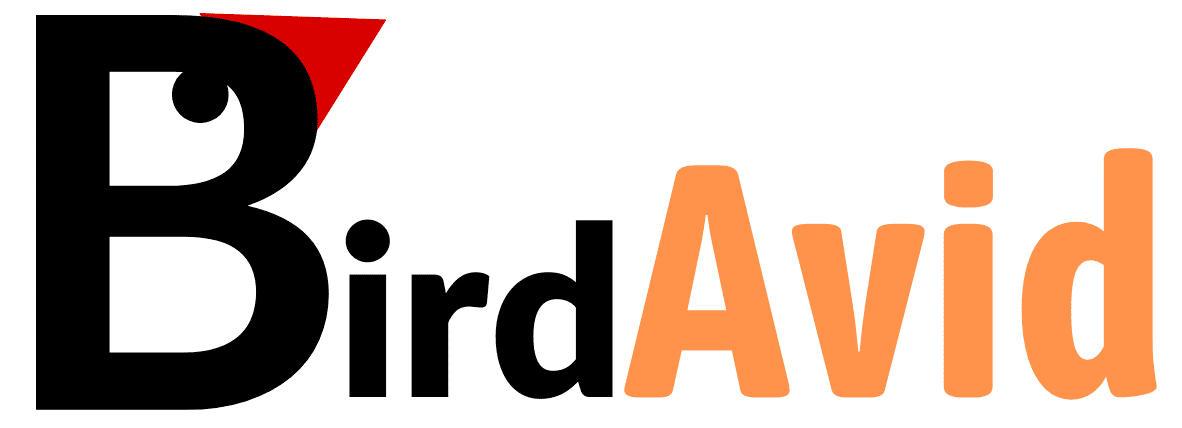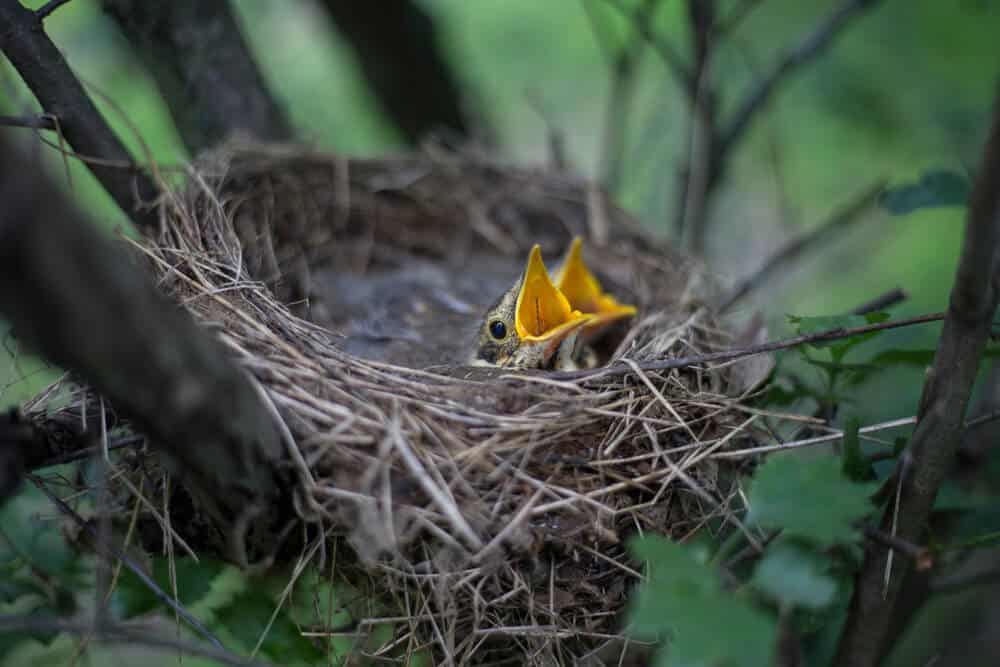You may be a bird enthusiast, or you may simply have had the fortune of finding a baby bird in need of help in your yard! No matter what the circumstance, it is possible that you’ve found yourself wondering: Do Baby Birds Drink Water?
Baby birds are incapable of searching for water on their own until they are old enough to fly, and they are also not equipped to handle large amounts of water poured into their throats. Instead, infant birds usually get their hydration from the fruit and insects that make up their usual diet until they are old enough to find and drink water on their own.
In this article, we’ll not only cover whether or not baby birds drink water, but how to give a baby bird the care it needs. We will even cover the answers to some of the web’s most frequently asked questions when it comes to this interesting topic. Let’s dive in!
Do Baby Birds Drink Water?
In nature, baby birds don’t drink the same way you or I might. When you consider the act of drinking, it usually involves swallowing water in its pure, liquid form using the muscles in our throats. However, a baby bird does not have muscles well developed enough to control how much water they ingest.
This is why it is not a good idea to force a baby bird that you find to swallow water. However, it is still true that baby birds need hydration as much as any of us do. So the question is, how do they get it?
In the wild, a baby bird is helpless as soon as it hatches. It is entirely dependent on the parents to keep it safe, sheltered, and bring it everything that it needs to survive. This includes food and, yes, water!
However, typically, an adult bird does not hold water in its mouth and pour it down the babies’ throats.
Instead, a baby bird is left to get the water it needs from the food sources brought to it. After all, fruit, bugs, and most of the things that an adult bird brings to nourish its young contain water inside.
This does not mean that it is totally impossible for a baby bird to sip tiny amounts of water from an available source if they can reach it, but it is not their normal way of staying hydrated.
How to Care For a Baby Bird’s Water Needs
The sad truth is, many baby birds are found helpless outside their nests. Sometimes this is because the baby bird got too close to the edge of its safe shelter and fell. Other times it is the result of outside forces, like a storm. But almost always, baby birds who have fallen from the nest are abandoned by the parents.
That is why it is completely natural and fair for you to try and care for the baby on your own!
However, after learning that a baby bird does not actually drink water the way other animals do, you might find yourself more overwhelmed about a baby’s needs. Don’t worry: we’ve prepared a step by step guide on how to get the little animal the fluids it requires!
- Keep the Bird in a Safe Place – Much like humans, and actually, all creatures, a stressed out bird may choose not to eat or to drink. Because of this, you need to make sure that a baby bird is kept in a warm, enclosed area like a box with plenty of oxygen.
- Offer a Small Water Receptacle – Using something shallow like a bottle cap or plastic tray, you can keep a small amount of water in the same box as your baby bird. This will give the tiny animal the option of drinking water if it wants to try. Don’t worry if it does not use this; remember that baby birds usually get their water from their food sources.
- Feed it Water-Rich Meals – Because a baby bird normally gets its water needs fulfilled by dietary supplements, as previously mentioned, this is the best way to make sure your little buddy gets its hydration. This can be done by diluting a little wet dog food with water, offering it cat food soaked in water, or, of course, nightcrawler worms!
- Soak a Cotton Swab in Water – You can use either a cotton swab or a sponge and soak this in water, placing it within the baby bird’s reach. Again, never force the baby bird to drink. If it isn’t getting enough water, chances are, its instincts will drive it to investigate the sponge or cotton swab and drink from it on its own.
How Often Should Baby Birds Drink Water?
Like all animals, baby birds need water on a regular basis or they can become dehydrated and even die. If your baby bird is old enough to begin moving more independently, even if it isn’t flying yet, you can assume that it is near adulthood and can take in water every six hours.
However, if your baby bird is nearly bald of all feathers, it might be only three or four days of age. In this case, it will need water more often. Try and get your baby bird to drink every two or three hours.
Finally, if you have a baby bird that is around one week old, with only a few signs of feathers, you can up the amount of times you try and give it a drink to three or four hours.
How Much Water Should I Give Baby Birds?
If you are taking care of a baby bird and trying to give it water according to the recommended amount of times listed above, it is important that you give the baby exactly as much water as it needs. Too much and you could actually drown the little creature; too little, on the other hand, and you risk dehydrating it.
A newly hatched baby bird should get between 50 milliliters and 80 milliliters every day to make sure they don’t suffer from dehydration. This is a general rule for all bird species.
However, as they mature, the difference in how much water a bird needs varies much more. Check out the table below for more information:
| Species of Bird: | Amount of Water Needed: |
| Cockatiel | Only small amounts of water: offer half a teaspoon of water at least, and a full teaspoon of water at most each day. |
| Robin | Greater water needs than any other species of songbird: offer around 25% of the robin’s body weight, and remember that they like to bathe in water, too. |
| Parrot | After the second week of life, a parrot needs 3 to 5 percent of their own body weight to remain healthy. |
| Dove | A dove differs in how much water it needs depending on the type of dove, but in general, most doves need almost three percent of their body weight in water. |
| Parakeet | A parakeet does not need as much water as other species’ of bird to survive: it only needs 3 to 5 percent of its body weight to survive at most ages. |
| Finch | Finches generally take 20 percent of their own body weight in water: offer up to ¾ of an ounce of water. |
Frequently Asked Questions:
1. Can you give water to a baby bird?
It is not a good idea to try and force a baby bird to drink water. They do not naturally get their hydration from drinking like you or I would, and instead tend to get their hydration from the bugs or fruit they eat, as previously mentioned. Therefore, to stay on the safe side, only present water to a baby bird through the use of a soaked sponge or very shallow container.
2. What do you feed baby birds that fell out of the nest?
Baby birds still require the nutrients that their parents spend all day hunting for them, especially after being newly hatched. In order to get them the food they need, you can usually offer them dog or cat food.
Remember that baby birds can’t chew these things: you’ll need to thoroughly moisten hard kibble, or offer wet food for the best results. You can also give a baby bird raw liver or hard boiled eggs, but make sure they are not seasoned!
3. How do you take care of abandoned baby birds?
The best thing to do for the health of the baby bird and yourself is to call a licensed professional, such as a local wildlife agency or even a vet. However, if you’re determined to take care of a baby bird yourself, handle it gently and with gloves. Baby birds are incredibly fragile.
The sooner the baby bird is out of your hands and in a warm, enclosed box, the better. Make sure it has plenty of air and feed it with moistened dog food or worms.
Wrapping Up
In short, baby birds do not drink water the way most mammals do. However, they do require some water to stay healthy and hydrated. This usually comes from the baby’s dietary intake of insects or fruit, brought to them by the parents, which contains some water content.
If you do decide to care for a baby bird, you should never force the bird to drink. Make sure that the baby has access to plenty of hydrated food, such as moist dog food, and if you do decide to present water, put it in a shallow container.


